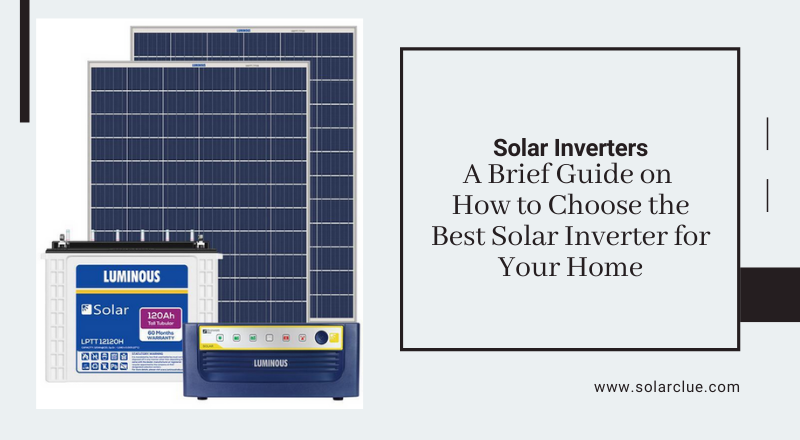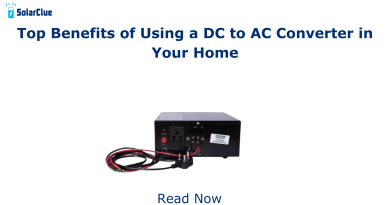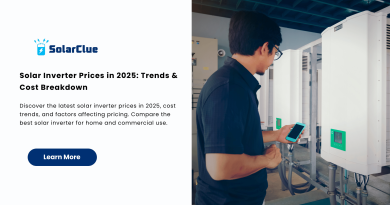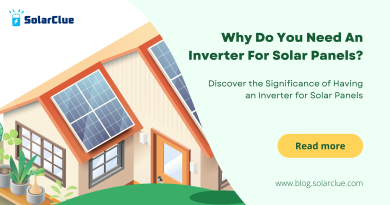Solar Inverters: A Brief Guide on How to Choose the Best Solar Inverter for Your Home
Looking for installing solar, or upgrade an existing system in your building? The solar inverter is one of the important components to consider, which accounts for a high cost in a solar project, and it turns power from the solar panels into usable power for your home. The Solar inverters are an essential part of any home’s solar system, and often the first part to fail.
The solar inverter’s job is ever-expanding as its primary role to convert DC power created by the sun into usable AC power (what we plug into our walls). Inverters allow installers or property owners to monitor how a system is performing. The price of the inverter depends on its size and brand when it comes to solar inverter price.
It is developed from a single function of converting energy to various capabilities and giving options for additional uses such as administrations, data monitoring, utility controls, and applications— all to promise the inverter can work at the maximum level. In addition to this, the inverter is used in keeping the system running as productively and dependably as possible is crucial. And, enhanced inverter performances stimulates more output production, yielding better returns for homeowners.
The following is a brief guide to look at the basics of Inverters, the different types of inverters, and factors to consider when choosing a solar inverter. Let us get started!
Table of Contents
What is Solar Inverter & its functionality?
A Solar Inverter is part of the Balance of System (BOS), which comprised of all the solar PV components and the solar panels such as wiring, mounting structures, and power conditioners that help manage the AC load and balances the DC (direct current) generation by the solar panels. A reliable yet high-functioning inverter keeps the whole solar system running efficiently with high energy production and low maintenance costs.
Inverters are used to convert direct current (DC) electricity that comes either directly from solar panels or battery storage to standard alternating current (AC) electricity and used to run all commercial appliances. An inverter is the main access between the photovoltaic (PV) system and the users of energy, and it performs several other functions such as data monitoring and advanced utility controls.
Types of Solar Inverters
Grid Tied Inverters: – These inverters are used with the Grid-tied solar PV systems, and in this system, the inverters convert Direct Current (DC) generated by the solar panels to Alternating Current (AC) equal to the voltage of the grid power.
Off-grid Inverters: – These inverters are used in Off-Grid solar PV systems, completely disconnected from the grid power. These types of inverters are used at home, which converts grid power (AC) to DC (Direct Current) for battery power backup, and when there is a grid failure converts DC to usable AC power for power consumption.
Grid interactive or Hybrid Inverters: – It is a combination of grid-tied and Off-grid systems, which supply power from solar to the grid for feed-in-tariff credits and use the battery backup for power storage.
String inverters: – The solar panels with this kind of inverter are stringed together with parallel connections going to a single centralized inverter, which converts the Direct current generated from the solar panels to Alternating current (AC).
Central Inverters: – The DC power produced from each string when you use a central inverter that runs along wires to combiner boxes, where they get connected in parallel with other strings.
Micro inverters: – These are installed for individual solar panels, which convert DC to AC and using such type of inverter, users also monitor the performance of individual panels.
Power optimizers: – These are fixed to the individual solar panels to condition Direct current generated from the solar panel and are directed to a central inverter.
Essential Factors to Consider When Purchasing Solar Inverters
- Capacity – The maximum load that you can connect to the inverter. For example, if the capacity of the inverter is 1MW, then it can support a maximum load of 1MW.
- Battery – It ensures how much a solar inverter can offload and what loads can be supported when there are power outages.
- Surge Power Considerations – Surge Power is the maximum power that the inverter can supply, usually for a short time, and used for certain appliances when they require high power and then they operate using the typical power.
- Power Maximization MPPT – This technology is used by the grid-tied inverters to optimize Solar panels for supplying maximum power output. Maximum power point technology is the optimal condition where Solar Panels produce the most power. However, it varies based on temperature, Shading, irradiance levels, and other factors.
- Programmable Controls for Regulation and Monitoring – There are several factors like temperature, irradiance, heat, shade, and others responsible for the solar panel’s output. Also, there should be programmable controls in the form of display panels to monitor the energy output from the solar panels.
Final Say
We at SolarClue provide a wide range of solar products like solar inverters on several renowned brands that serve the purpose of on-grid and off-grid solar PV systems. We offer wholesale solar inverters online and in all varieties from leading manufacturers. If you have any queries about solar inverters, please get in touch with us at +91 – 7829889111. We would be happy to help you!





Pingback: 5 tips about choosing the best solar panels for your home - Blog | Solarclue.com
Nice blog. Thanks for sharing the information.
Best Quality Solar Water Heater trader and supplier in Punjab
Hello,
Thanks for your appreciation.
I am just commenting to make you know of the exceptional discovery my friend’s princess encountered checking your web site. She noticed lots of issues, which included what it’s like to have an ideal teaching heart to make other folks very easily learn about chosen advanced matters. You really exceeded my expected results. Many thanks for delivering these productive, healthy, educational and even easy guidance on that topic to Evelyn.
Hello,
Thank you for your encouraging words. We value and respect your opinion.
Your article has been very good. However, it would have been better to add a little more writing.
Hello,
Thanks for your appreciation! We will consider your feedback in future.